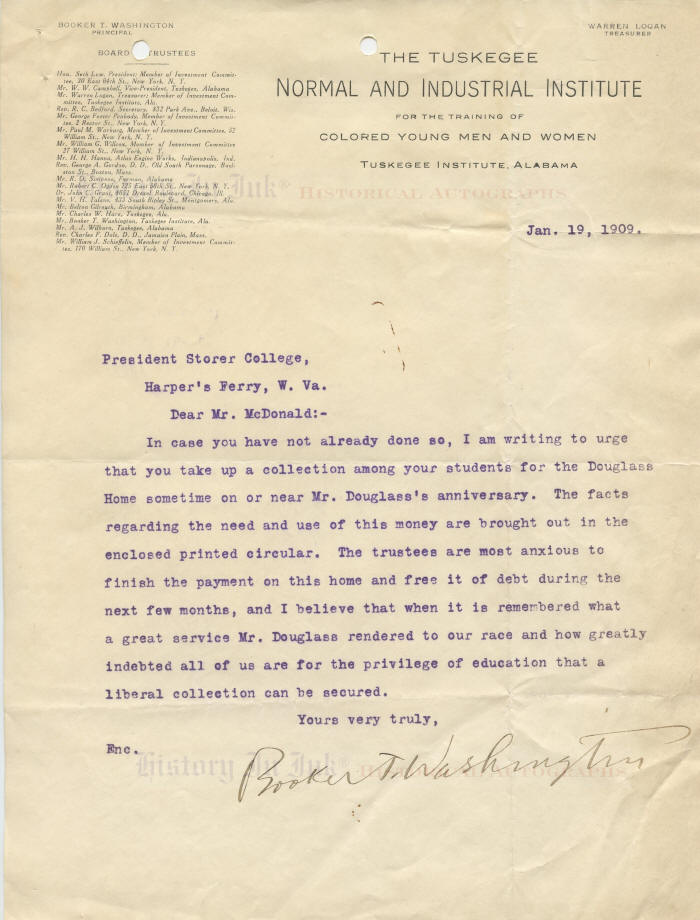

2016301
Booker T. Washington
“ . . . what a great service Mr. Douglass rendered to our race . . . ”
Booker Taliaferro Washington, 1856–1915. African-American educator and leader. Superb Typed Letter Signed, Booker T. Washington, one page, 8½” x 11”, on stationery of the Tuskegee Normal and Industrial Institute, Tuskegee Institute, Alabama, January 19, 1909.
This is a superb letter, with an excellent association as well, in which one great African-American writes of another. Washington, the leading African-American of his age, acknowledges the “great service” that Frederick Douglass, the leading African-American of his age, “rendered to our race.”
In this letter, Washington seeks financial assistance to help preserve Douglass’s home, Cedar Hill, in the Anacostia neighborhood of Washington, D.C. He writes to Henry T. McDonald, the president of Storer College, a historically African-American college in Harper’s Ferry, West Virginia. In full: “In case you have not already done so, I am writing to urge that you take up a collection among your students for the Douglass Home sometime on or near Mr. Douglass’s anniversary. The facts regarding the need and use of this money are brought out in the enclosed printed circular [not included]. The trustees are most anxious to finish the payment on this home and free it of debt during the next few months, and I believe that when it is remembered what a great service Mr. Douglass rendered to our race and how greatly indebted all of us are for the privilege of education that a liberal collection can be assured.”
Douglass extolled the value of education at the dedication of the Manassas Industrial School for Colored Youth in 1894. “Education . . . means emancipation,” he said. “It means light and liberty. It means the uplifting of the soul of man into the glorious light of truth, the light only by which men can be free. To deny education to any people is one of the greatest crimes against human nature.”
Washington called Douglass “the greatest man that the race has produced.” In the preface to his biography of Douglass, he wrote that although Douglass “would have been a notable character in any period,” nevertheless “in the life of hardly any other man was there comprehended so great a variety of incidents of what is perhaps the most memorable epoch in our history.” He expressed his gratitude for the opportunity that writing the book gave him “of getting close to the heart and life of this great leader of my race. No Negro can read and study the life of Frederick Douglass without deriving from it courage to look up and forward.” Booker T. Washington, Frederick Douglass 6–7 (1906).
This letter is part of the national campaign that Washington began in 1908 to raise funds for the Frederick Douglass Memorial and Historical Association, a congressionally chartered nonprofit organization founded by Douglass’s widow, Helen, to “preserve to posterity the memory of the life and character” of Douglass and to “collect, collate, and preserve an historical record . . . of the anti-slavery movement.” Money raised through Washington’s efforts substantially reduced the mortgage on Cedar Hill that the Association had inherited.
Washington’s reference to “Mr. Douglass’s anniversary” is likely to the anniversary of Douglass’s death on February 20, 1895. It could, however, be a reference to February 14, the date that Douglass chose later in life to celebrate as his birthday. Most sources state that Douglass was born around February 1818, taken from a statement in his autobiography that he heard his master say in 1835 that he was about 17 years old. Douglass said, however, that he did not know when his birthday was.
This letter has an excellent association as well to Storer College, a historically African-American college in Harpers Ferry, West Virginia, founded to train African-American teachers after the Civil War. On May 30, 1881, Douglass delivered a speech praising abolitionist John Brown, whom the federal government hanged for his attempt to initiate an armed slave rebellion in the South by seizing the United States arsenal at Harpers Ferry. Douglass disapproved of Brown’s plan at the time. But at Storer College, Douglass shared the stage with Andrew J. Hunter, the prosecutor who secured Brown’s conviction and execution, and, as Douglass himself described it, was “allowed to deliver an address, not merely defending John Brown, but extolling him as a hero and martyr to the cause of liberty.” Life and Times of Frederick Douglass 501 (1882). The speech itself was published as John Brown: An Address by Frederick Douglass, at the Fourteenth Anniversary of Storer College (1881).
Washington has signed this letter with a huge 5½” brown fountain pen signature. The letter has a single vertical fold that barely touches the “h” and passes through the connection to the “i” in Washington’s signature. There are also three horizontal folds that do not affect the signature; a partial paper clip stain in the blank area above the text; staple holes in the upper right blank margin; two filing holes at the top, one of which affects the printed letterhead; and handling marks at the lower right. Overall the piece is in fine condition.
Unframed.
_____________
This item has been sold, but
click here to see other
American History items
that we are offering.



